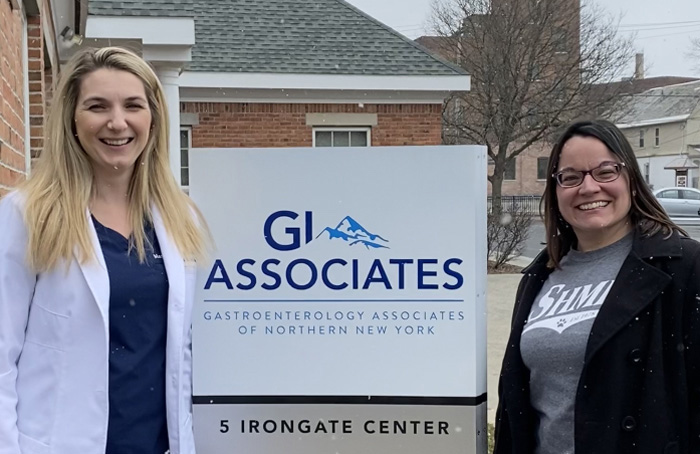By Caroline Martindale, Chronicle Staff Writer
Cases of colon cancer are rising in adults ages 20 to 40.
Rose Cournoyer of South Glens Falls knows first-hand. She was 24 years old when she was diagnosed with stage 2B colon cancer. She’s now 37.

“I had a port put in and then I had chemo and radiation together first and then I had surgery to remove the tumor and I had an ileostomy bag for eight months, I believe it was,” Rose said.
“Then I had reversal surgery, so I was able to get rid of the ileostomy bag. And then I had another round of chemo as a preventative treatment.
“But when they went in and got the tumor the cancer was gone.”
Rose said she has been cancer-free for 13 years. She credits her survival to the early discovery.
“I think a lot of people are embarrassed to get tested or if they are younger, they don’t advocate for themselves. I think that people don’t advocate for a lot of things. And I think your health is for sure one thing that you should definitely advocate for,” she says.
“My stomach pain was so bad that some days I literally would have to just go to bed. I would be laying on my bed in a fetal position. Nothing really helped it.
“I was going to my doctor monthly at that point. And I almost was just like, ‘Well, maybe it’s something or stress or whatever. Maybe not.’
“If I hadn’t gone then I would have never found out that I had cancer.”
March is colon cancer awareness month and GI Associates encourages everyone to get screened. Screenings like colonoscopies test patients for colon cancer or polyps.
“How colon cancer develops is through polyps,” says Dr. Mary Strader of Five Irongate Center. “Polyps grow, those are benign, they’re not cancerous, but over time, they get mutations, and they turn into cancer.”
If polyps are present, doctors remove them before they mutate.
“It’s a very treatable disease in the early stages,” Dr. Strader said.
“And that’s what’s so great about having the screening tests available to us. If you get screened and we detect this at an early stage, there’s a very good chance of survival.”
In May 2021 the U.S. Preventive Services Task Force reduced its colorectal screening recommendation from 50 years old to 45.
“Across the U.S. about 60% of people are being screened at the appropriate age. And the benchmark nationally is to try and get that to 80%,” says Dr. Strader.
After screening, patients should get colonoscopies every 10 years. Alternative tests like Cologuard are every three years and FIT (fecal immunochemical test) is every year.
“75% of people who are passing away from colorectal cancer are not up to date on their screenings,” warns Dr. Strader.
Scheduling a screening is simple. “They just call their primary care and say, ‘I’m ready for my colonoscopy,’ and they’ll send a referral to us.
“Sometimes patients come in and see us ahead of time in the clinic and other times they come directly to the endoscopy unit the day of their exam, and we call them and go over the prep instructions and when to come.”
For information about colon cancer symptoms and treatments, visit GI Associates website at giassociatespc.com.
Copyright © 2024 Lone Oak Publishing Co., Inc. All Rights Reserved
 Glens Falls Chronicle Serving the Glens Falls/Lake George region; Warren, Washington and northern Saratoga counties since 1980
Glens Falls Chronicle Serving the Glens Falls/Lake George region; Warren, Washington and northern Saratoga counties since 1980

